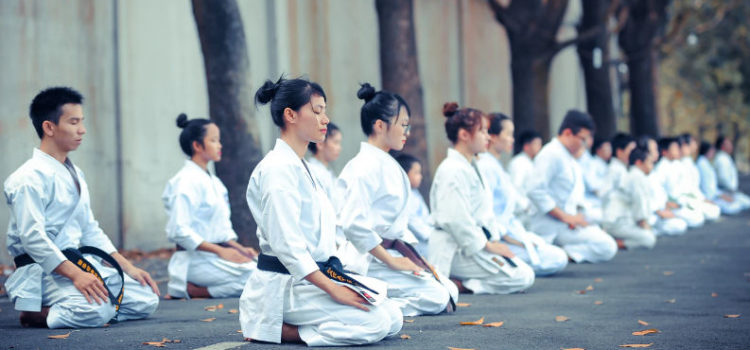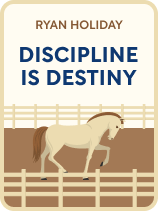

This article is an excerpt from the Shortform book guide to "Discipline Is Destiny" by Ryan Holiday. Shortform has the world's best summaries and analyses of books you should be reading.
Like this article? Sign up for a free trial here.
Are your emotions out of control and creating self-destructive patterns? How can discipline help these patterns?
Discipline isn’t easy, but it’s worth it. In Discipline Is Destiny, Ryan Holiday outlines several of its advantages. Discipline can keep you from going to extremes, helps you live a good life, regulates your emotions, and increases your self-awareness.
Let’s take a closer look at these four benefits of discipline that you can experience.
4 Benefits of Discipline
Discipline is the ability to restrain your baser urges in pursuit of what’s best for you. When you’re disciplined, you act with moderation, and you prize your ability to have total control over yourself. Like all humans, you face temptations, but you can resist these temptations when you need to—and if you do choose to indulge in them, you do so with restraint.
(Shortform note: In The Power of Discipline, Daniel Walter agrees that discipline is the ability to fight temptations and instant gratification and ultimately act in your best interests. However, his definition of discipline doesn’t include the ability to indulge in temptations with restraint; it also doesn’t include a sense of self-satisfaction that stems from having self-control. Additionally, Walter suggests that we struggle with discipline due to four biological tendencies: resisting change that makes us uncomfortable, overestimating our abilities, procrastinating, and setting unrealistic expectations.)
Holiday asserts that there are four benefits of discipline:
Benefit #1: Keeps You From Going to Extremes
Discipline prevents you from taking the four cardinal virtues of Stoicism (courage, wisdom, justice, and temperance or discipline) to extremes and turning them into flaws. For example, extreme courage might also be characterized as recklessness. Since discipline is predicated on practicing moderation, it prevents you from taking the cardinal virtues too far and thus not living a good life.
(Shortform note: It’s clear how too much courage can harm you, but how can you take being just or wise too far? Holiday doesn’t specify, but other experts explain that the Stoic virtue of justice involves honesty, so you might be unvirtuous if you’re unnecessarily honest with someone and hurt their feelings for no reason. However, it’s not clear how being too wise can become a flaw.)
Benefit #2: Leads to a Good Life
Discipline leads to a good life. Holiday explains that when you’re disciplined, you make better choices with your time: You regularly work to fulfill your purpose (which we’ll discuss in detail later) rather than wasting time with less important endeavors, such as watching Netflix every evening. The more time you spend working on your purpose, the more likely you are to fulfill it—and thus reap the benefits of doing so.
(Shortform note: Unless you develop discipline, you may never achieve your best life. In The Power of Discipline, Walter argues that not making good choices with your time (by wasting it on unimportant endeavors) is not only undisciplined, but it can also reduce your levels of self-discipline and make you even less likely to spend time on and fulfill your purpose than you already were. He argues that self-discipline is a skill that takes practice to develop. So the more you procrastinate (a form of instant gratification that’s the opposite of self-discipline), the more habitual the procrastination becomes, and the weaker your ability to make productive choices becomes.)
Benefit #3: Creates Better Emotional Control
Holiday asserts that discipline lets you keep your good life because it stops you from allowing your emotions or baser urges to take control. When you’re disciplined, you take a moment to actively choose how to react to any situation that you face. As a result, even if you feel powerful emotions, they don’t dictate your actions and cause harmful consequences. For example, despite your fury at your boss, you listen quietly to her scolding and choose to look for another job on your own terms rather than exploding at her and getting fired.
(Shortform note: Not everybody agrees that you’re able to choose how to react in any situation. In Thinking, Fast and Slow, psychologist Daniel Kahneman argues that automatic (fast) impressions arise from our senses and feelings (he calls this the mind’s “System 1”). Like Holiday, he acknowledges that these impressions can lead us to make poor choices that cause harmful consequences. But he believes it’s not feasible to always check them through our disciplined rational mind (“System 2”) because it’s too slow. He suggests a compromise: Be aware of situations where System 1 thinking might lead to errors, and avoid those errors when the stakes are high by using System 2.)
Benefit #4: Increases Self-Awareness
Holiday argues that discipline makes you self-aware. You’re able to recognize when you risk overindulging in something potentially harmful and thus stop yourself from doing so. This is true both of physical pursuits, like food or alcohol, and of certain character traits. For example, you may be ambitious, but you don’t take it to the extreme of constantly pursuing power and ignoring other things that matter, like your relationships.
(Shortform note: In 10% Happier, Dan Harris agrees that being self-aware can make you more thoughtful and intentional in your approach to everyday life. However, he calls this self-awareness “mindfulness” and argues that it comes from regularly practicing meditation—not discipline. Meditation teaches you to notice and accept your feelings—like your desire for more food or alcohol or power—and then choose how to respond to them. Harris learned from his mentor that if you try to ignore these feelings, you just give them more power and influence over your actions.)

———End of Preview———
Like what you just read? Read the rest of the world's best book summary and analysis of Ryan Holiday's "Discipline Is Destiny" at Shortform.
Here's what you'll find in our full Discipline Is Destiny summary:
- Why your ability to practice discipline determines how successful you are
- How to practice discipline throughout various stages of your life
- Why the greatest enemy to discipline is your ego







Nice knowledge of the day thanks very much